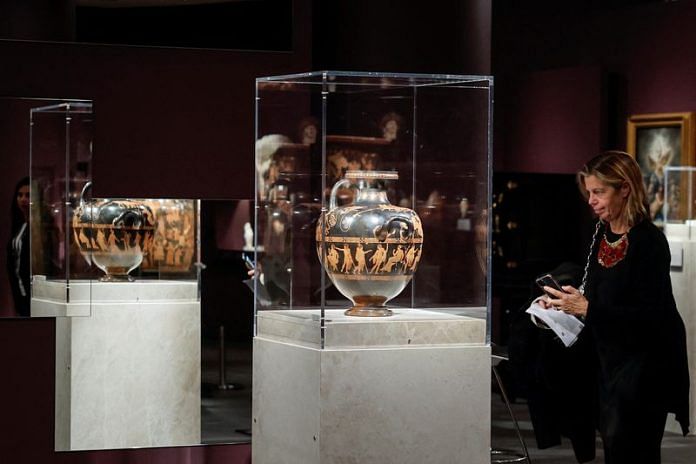ATHENS (Reuters) – The British Museum has lent for the first time in 250 years an ancient Greek water vase, the Meidias hydria, to the Acropolis Museum in Athens for an exhibition which begins this week and runs until April.
The loan comes amid a dispute between Greece and Britain over the permanent return of the Parthenon Sculptures from the British Museum to Athens which led to the cancellation of a meeting between the country’s two leaders in London last week.
The 2,500-year-old hydria, signed by Athenian potter Meidias, is decorated with red figures reflecting the mythical encounters of humans with ancient Greek gods, among them half-mortal Hercules, the goddess of love Aphrodite, and Zeus.
The water jar was made in 440-420 BC. Meidias is the potter’s name but the painter of the vase is unknown.
It was excavated in Italy, probably from a tomb although how it got there is uncertain, and acquired in the 1760s by British diplomat Sir William Hamilton who sold it to the British Museum in 1772. Since then it has been on display in the museum’s galleries of ancient Greece and has never been loaned before.
Acropolis Museum Director Nikolaos Stampolidis said exactly this type of vase was depicted on the marble frieze of the Parthenon and it was very important “to not only have the picture of the hydria… but also the piece itself.”
The hydria will be part of the Dec 4-April 14 Acropolis museum exhibition “NoHMATA” (Meanings) which presents a mix of artwork, including the bronze 400 BC Chimera of Arezzo from the Archaeological Museum of Florence and a Rubens painting depicting Saturn devouring his son from the Museo del Prado.
Asked if there was difficulty in acquiring the artefacts under loan for the exhibition, Stampolidis said the British Museum and Acropolis Museum had “very good relations”, and he expected the Parthenon Sculptures would eventually return home.
“The two museums have very good relations and we expect that at the end, the marbles … will come back and be reunited here in this temple of beauty and harmony, the museum of Acropolis,” Stampolidis said.
(Reporting by Deborah Kyvrikosaios and Renee Maltezou, Editing by Alexandra Hudson)
Disclaimer: This report is auto generated from the Reuters news service. ThePrint holds no responsibilty for its content.



